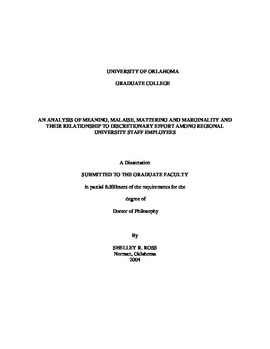| dc.contributor.advisor | Pope, Myron L., | en_US |
| dc.contributor.author | Ross, Shelley R. | en_US |
| dc.date.accessioned | 2013-08-16T12:19:29Z | |
| dc.date.available | 2013-08-16T12:19:29Z | |
| dc.date.issued | 2004 | en_US |
| dc.identifier.uri | https://hdl.handle.net/11244/772 | |
| dc.description.abstract | Recommendations for administrators and other practitioners included: increase the awareness of the various perceptions of the university that different groups hold; provide opportunities for staff to be involved in the decision making process, campus committees and departmental meetings; incorporate the mission and goals of the university into job descriptions and employee evaluations; and remember to express appreciation and provide recognition to those staff members outside of the spotlight. Recommendations for further research included: determining what factors may be associated with the 4 M's and what extent are the two categories---mattering/marginality, meaning/malaise related; what cultural factors affect the two categories; why do employees change jobs and move into higher education positions; and how can staff be involved in shared governance of the university. | en_US |
| dc.description.abstract | Two hundred fifty-seven (257) university staff employees, representing two regional institutions, responded to a survey that was designed to capture their perceptions of mattering/marginality, meaning/malaise and discretionary effort. Results of the study showed employees to have only a slight sense of perceiving to matter to their institution and they feel somewhat marginalized when their opinions are not valued. Staff members are finding meaning in their jobs and are not experiencing malaise. Respondents were also given the opportunity to respond to open-ended questions; which, in turn, provided additional information of the staff's understanding and perception of the mattering/marginality and meaning/malaise. Meaning/malaise were related to the staff's classification (front-line, backstage academic). The 4 M's were related to the employee's age and intent to stay. No relationship was found between the 4 M's and discretionary effort. | en_US |
| dc.description.abstract | The purpose of this study was to gain an understanding of the perceptions of university staff concerning their job and their value to the university community and the relationship of these perceptions to their discretionary effort with respect to (1) mattering and marginality and (2) meaning and malaise (4 M's) (Karpiak, 1997). Mattering and marginality is the staff's perception of caring and interest by the administration and faculty toward them; meaning and malaise is the staff's extent of caring and interest related to their work (Karpiak, 1997). Discretionary effort measures the extent of how hard an employee believes he or she is working (Yankelovich & Immerwahr, 1983). | en_US |
| dc.format.extent | ix, 123 leaves : | en_US |
| dc.subject | Universities and colleges Oklahoma Employees Attitudes. | en_US |
| dc.subject | Education, Higher. | en_US |
| dc.subject | Psychology, Industrial. | en_US |
| dc.subject | Employee morale Oklahoma. | en_US |
| dc.subject | Employee motivation Case studies. | en_US |
| dc.subject | Employee motivation Oklahoma. | en_US |
| dc.subject | Employee morale Case studies. | en_US |
| dc.subject | Education, Administration. | en_US |
| dc.subject | Universities and colleges Employees Attitudes Case studies. | en_US |
| dc.subject | Employee attitude surveys Oklahoma. | en_US |
| dc.title | An analysis of meaning, malaise, mattering and marginality and their relationship to discretionary effort among regional university staff employees. | en_US |
| dc.type | Thesis | en_US |
| dc.thesis.degree | Ph.D. | en_US |
| dc.thesis.degreeDiscipline | Department of Educational Leadership and Policy Studies | en_US |
| dc.note | Adviser: Myron L. Pope. | en_US |
| dc.note | Source: Dissertation Abstracts International, Volume: 65-07, Section: A, page: 2521. | en_US |
| ou.identifier | (UMI)AAI3138957 | en_US |
| ou.group | Jeannine Rainbolt College of Education::Department of Educational Leadership and Policy Studies | |
